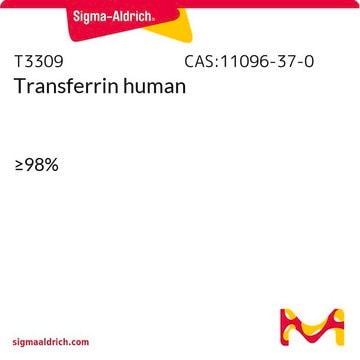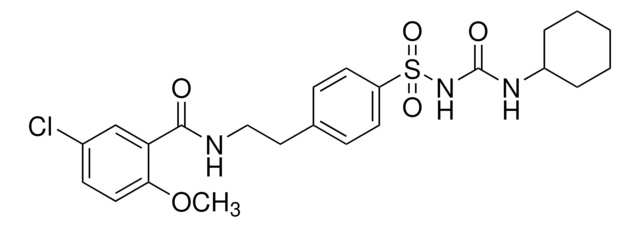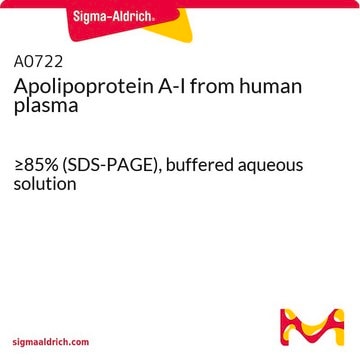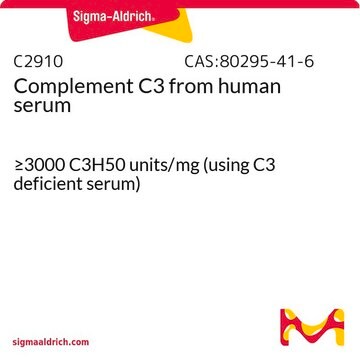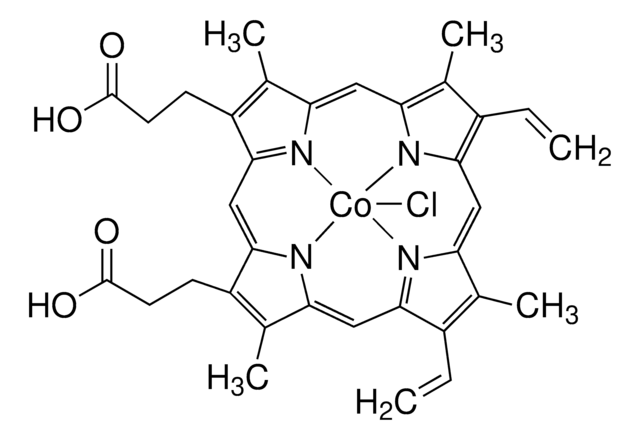H9291
Hemopexin from human plasma
≥95% (SDS-PAGE), lyophilized powder
Synonym(s):
HPX, HX, Hpxn, beta-1B-glycoprotein
Sign Into View Organizational & Contract Pricing
All Photos(1)
About This Item
Recommended Products
General description
Hemopexin (HPX) is produced by cells of the central nervous system. It is a 60 kDa serum glycoprotein.
Application
Hemopexin from human plasma has been used S. aureus surface colonization assay. It has also been used to stimulate mixed lymphocyte cells to determine the biomarkers in acute rejection.
Biochem/physiol Actions
Hemopexin is an acute-phase protein that plays a major protective role against oxidative stress through its heme-scavenging activities. Hemopexin binds heme with high affinity and is critical for recycling the iron bound to heme molecules and for protecting against heme-induced cellular damage. Free heme, when released or lost from proteins like hemoglobin, can catalyze the formation of reactive oxygen species. Heme is lipophilic and interchelates into lipid membranes and participate in the formation of highly-toxic hydroxyl radicals. Hemopexin may also protect against the heme-mediated oxidation of LDL cholesterol.
Hemopexin may also serve an anti-inflammatory role via the negative regulation of IL-6 and TNF-α secretion by activated macrophages.
Hemopexin may also serve an anti-inflammatory role via the negative regulation of IL-6 and TNF-α secretion by activated macrophages.
Physical form
Lyophilized powder containing sodium phosphate, NaCl, and KCl, pH 7.4
Disclaimer
RESEARCH USE ONLY. This product is regulated in France when intended to be used for scientific purposes, including for import and export activities (Article L 1211-1 paragraph 2 of the Public Health Code). The purchaser (i.e. enduser) is required to obtain an import authorization from the France Ministry of Research referred in the Article L1245-5-1 II. of Public Health Code. By ordering this product, you are confirming that you have obtained the proper import authorization.
Storage Class Code
11 - Combustible Solids
WGK
WGK 3
Flash Point(F)
Not applicable
Flash Point(C)
Not applicable
Choose from one of the most recent versions:
Already Own This Product?
Find documentation for the products that you have recently purchased in the Document Library.
Customers Also Viewed
Tirthartha Chattopadhyay et al.
Biochemical and biophysical research communications, 420(4), 862-868 (2012-04-03)
Proteins containing hemopexin fold domain are suggested to have diverse functions in various living organisms. In order to investigate the structure and function of this type of protein in rice plant (Oryza sativa), the gene encoding a hemopexin fold protein
Hemopexin alleviates cognitive dysfunction after focal cerebral ischemia-reperfusion injury in rats
Dong B, et al.
BMC anesthesiology, 19(1), 13-13 (2019)
Laura Vicente-Vicente et al.
Toxicology, 304, 83-91 (2012-12-25)
Drug nephrotoxicity is a serious health and economic problem worldwide. Rats can be acutely sensitized to acute kidney injury (AKI) by subnephrotoxic treatments with potentially nephrotoxic drugs. Acquired sensitization to AKI poses a silent risk impossible to diagnose pre-emptively with
Aubrey J Cunnington et al.
Journal of immunology (Baltimore, Md. : 1950), 189(11), 5336-5346 (2012-10-27)
It is not known why people are more susceptible to bacterial infections such as nontyphoid Salmonella during and after a malaria infection, but in mice, malarial hemolysis impairs resistance to nontyphoid Salmonella by impairing the neutrophil oxidative burst. This acquired
Kazuhiko Kawasaki et al.
European journal of oral sciences, 119 Suppl 1, 247-253 (2012-01-25)
Dental enamel is a hypermineralized tissue, containing only trace amounts of organic components. During enamel formation, matrix metalloproteinase 20 (MMP20) processes proteins comprising enamel matrix and facilitates hypermineralization. In the human genome, 24 distinct MMP genes have been identified. Among
Our team of scientists has experience in all areas of research including Life Science, Material Science, Chemical Synthesis, Chromatography, Analytical and many others.
Contact Technical Service
